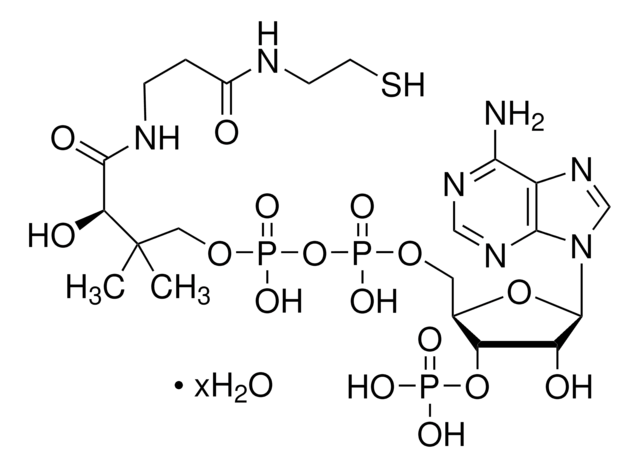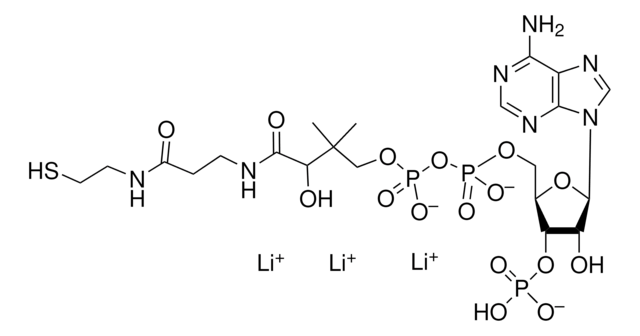A3352
Acyl-coenzyme A Synthetase from Pseudomonas sp.
≥2 units/mg protein
Synonim(y):
Acid: CoA ligase (AMP-forming)
Zaloguj sięWyświetlanie cen organizacyjnych i kontraktowych
About This Item
Polecane produkty
Postać
powder
Poziom jakości
aktywność właściwa
≥2 units/mg protein
Warunki transportu
dry ice
temp. przechowywania
−20°C
Szukasz podobnych produktów? Odwiedź Przewodnik dotyczący porównywania produktów
Opis ogólny
Acyl-coenzyme A synthetase belongs to adenylate-forming enzymes superfamily. It has a conserved adenosine triphosphate/adenosine monophosphate (ATP/AMP) binding motif.
Zastosowanie
Acyl-coenzyme A (coA) synthetase from Pseudomonas sp. has been used:
- as ligase in the synthesis of mevalonate derivatives of adenosine triphosphate (ATP)
- in in vitro fatty acylation assays
- in the synthesis of (14C)Vernoloyl-CoA (Va-CoA),(3) bisphosphonates derivatives of ATP(4) and (3H)Palmitate-CoA
Acyl-coenzyme A Synthetase may be used to study fatty acid metabolism and lipid metabolism. It has been used to study its interaction with fatty acid transport proteins, which has been found to be involved in the efficient cellular uptake of long-chain fatty acids in adipocytes .
Działania biochem./fizjol.
Acyl coenzyme A synthetase proteins are involved in regulating and facilitating long-chain fatty acid transport in mammalian cells .
Acyl-coenzyme A (CoA) synthetase (ACS) enzyme catalyzes a two-step thioesterification reaction involving the conversion of free fatty acids (FAs) to CoA esters. The substrate for ACS varies from two carbon to 26 carbon FAs. It is involved in the activation of FAs for lipid metabolism and enables FA to participate in various cellular metabolic pathways.
Definicja jednostki
One unit will form 1.0 μmole of AMP and oleoyl coenzyme A from ATP and oleate at pH 8.1 at 25 °C in the presence of Coenzyme A.
This page may contain text that has been machine translated.
Kod klasy składowania
11 - Combustible Solids
Klasa zagrożenia wodnego (WGK)
WGK 3
Temperatura zapłonu (°F)
Not applicable
Temperatura zapłonu (°C)
Not applicable
Środki ochrony indywidualnej
Eyeshields, Gloves, type N95 (US)
Certyfikaty analizy (CoA)
Poszukaj Certyfikaty analizy (CoA), wpisując numer partii/serii produktów. Numery serii i partii można znaleźć na etykiecie produktu po słowach „seria” lub „partia”.
Masz już ten produkt?
Dokumenty związane z niedawno zakupionymi produktami zostały zamieszczone w Bibliotece dokumentów.
Klienci oglądali również te produkty
Structural snapshots for the conformation-dependent catalysis by human medium-chain acyl-coenzyme A synthetase ACSM2A
Kochan G, et al.
Journal of Molecular Biology, 388(5), 997-1008 (2009)
Synthesis of ATP derivatives of compounds of the mevalonate pathway (isopentenyl di-and triphosphate; geranyl di-and triphosphate, farnesyl di-and triphosphate, and dimethylallyl diphosphate) catalyzed by T4 RNA ligase, T4 DNA ligase and other ligases: Potential relationship with the effect of bisphosphonates on osteoclasts
Sillero MAG, et al.
Biochemical Pharmacology, 78(4), 335-343 (2009)
Naohiro Kurotaki et al.
PloS one, 6(5), e20589-e20589 (2011-06-10)
The recent development of high-resolution DNA microarrays, in which hundreds of thousands of single nucleotide polymorphisms (SNPs) are genotyped, enables the rapid identification of susceptibility genes for complex diseases. Clusters of these SNPs may show runs of homozygosity (ROHs) that
A Ruść et al.
Meat science, 89(4), 440-443 (2011-06-10)
The aim of the study was to check whether different genotypes at acyl-CoA synthetase (ACSL4 locus, SNP G2645A) are associated with pork quality. 132 (Landrace × Yorkshire) × Duroc fatteners were genotyped by originally developed PCR-RFLP method. Upon the slaughter
Michael Veit et al.
Methods in molecular biology (Clifton, N.J.), 446, 163-182 (2008-04-01)
Palmitoylation or S-acylation is the post-translational attachment of fatty acids to cysteine residues and is common among integral and peripheral mem brane proteins. Palmitoylated proteins have been found in every eukaryotic cell type examined (yeast, insect, and vertebrate cells), as
Nasz zespół naukowców ma doświadczenie we wszystkich obszarach badań, w tym w naukach przyrodniczych, materiałoznawstwie, syntezie chemicznej, chromatografii, analityce i wielu innych dziedzinach.
Skontaktuj się z zespołem ds. pomocy technicznej







